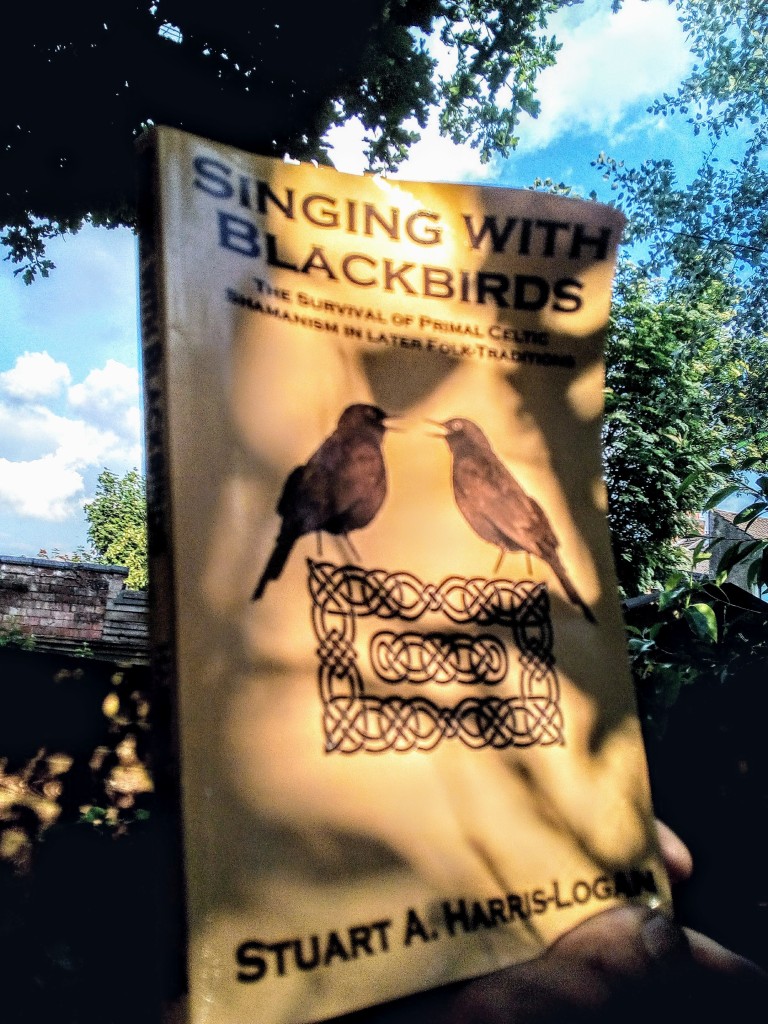Yesterday I had need to wait somewhere. This was preceded by a somewhat rushed exit from where I currently dwell. Also I knew I might have rather a long wait, 4 to 6 hours in that other place. So I packed a pen, notepad, half read book. However shortly after setting off discovered no mobile phone – even though I had stowed a backup battery and lead – I am like that occasionally!
So, waiting a very long time, somewhat cut off from the telecommunications realm, but with a worthwhile book: ‘ Singing With Blackbirds – The Survival of Primal Celtic Shamanism in Later Folk-Traditions ‘ [ Stuart A. Harris-Logan ]. Lets just say it is somewhat of an academic book and thus far it had taken me a number of months, piecemeal, to read halfway. Not that it is uninteresting; in fact the author puts in a good balance between historical research, juicy details of the the vibrancy of Celtic spiritual life and legend. He draws some startling theories about how those pre-Christian ways show, for want of a better label, as he says, shamanic tendencies.
What did I observe about my quietness diligence, in reading, note taking and thinking, all surrounded by the hubbub of a busy technologically imbued environment? Well, for starters I noticed a number of people frustrated, as I might have been some years before, by the protracted wait. some checked their phones, frequently. Others quietly complained. But many to their credit, quietly sat, or even made the occasional humorous observation about their plight – with stoicism, but with that dry British collective observation of the world you might say. For myself I think I may have gained some startling insights; that together with a few confirmations ,of self-awareness. So, just staying with the more prosaic, for now, I can confirm that I can concentrate deeply in busy environment, on some task that takes me to an utterly different headspace. This is, of itself a good sign. But beyond that I wonder what immeasurable leap in focus might I achieve if I more regularly gave myself the gift of regular solitude? What level of immersion brings one closer to the source – like an old Irish saint steeping, themselves up to the chin in cold waters for hours at a time, as devotion? Or the sensory deprivation of the cave, or beehive hut, with or without fasting? Here is a question; did the aesthetes of yonder year have to go to so much further lengths to divorce themselves from the physicality and worldliness of those times? But then look, at us now, to what apparent extremes must we go to disconnect from modernity to achieve the same? Is that even possible for many people? Perhaps it is, but it requires a close – and patient – reading of ways from our not so long agos, but oft forgot, spiritual heritage.
Lastly, but by no means least, in revealing to me how my ancestors (or at least some of them) used language to reflect their worldview of kin, relationships and possession.
I was given much to reflect upon, particularly in relation to my poetry. In fact these ways of being and expression still remain, albeit on the Atlantic margins of western Europe:
Quotes from section ‘ The Voice of the Elements ‘
“In modern Scots Gaelic it is not possible to say mo duine (‘my man’ or ‘my husband), one must say an duine e agam (literally, ‘the man that is at me’). This construction removes any notion of possession: in Gaelic, one is not defined by one’s relationships . . .
. . . In order to express one’s occupation, one must say ‘s e leabharle thamam’, (literally, ‘it’s a librarian that’s within me). Again this construction removes the personal pronoun from the descriptive word.
Finally, one cannot be defined by one’s emotions. In Gaelic, in order to express fear, one must say tha an t-eagal orm (a fear is upon me). Interestingly, the verb ‘to be’ is derived from the Old Irish ta, meaning ‘to stand’. Therefore, when expressing personal information, one must say I stand… rather than I am.. again removing any sense of permanence.”
It would seem I could well benefit from re-framing my poetic expression away from the personal egoic ‘I’ of ‘my’ emotions and towards a more collective non-material expression of experience. The aforementioned expresion was all well enough, as initially my poetic expression arose as some sort of self therapy, addresing intensly personal issues. But now, for this world and my place to serve it, ‘times are a changing’ I feel. Why not take some time out from writing much more poetry, until this new perspective is fully gifted me, if such is possible?
I am reaching for, I suspect, the co-creative power that Haris-Logan, in citing Trevarthen, reveals as the essence of ‘shamanic’ passion. It is the somewhat elusive dan in old Irish; that being variously ‘skill’, ‘gift’, ‘art’, ‘poetry’, ‘power’, or indeed, ‘destiny’!
Harris-Logan, Stuart A., ‘ Singing With Blackbirds – The Survival of Primal Celtic Shamanism in Later Folk-Traditions, Girvan, Grey House in the Woods / Lightning Source.
Trevarthen, G.A. , 2003, Brightness OF brightness, Seeing Celtic Shamanism, Edinburgh, University of Edinburgh.
Becoming Aes Dana – WordPress.com



Great.
LikeLike
Thanks! First attempt at something like a book review slash writing journal entry.
LikeLike
I found the language examples fascinating. I love to see how different languages describe the world. Thank you!
LikeLike
Im terrible at languages – my French and German are very rudimentary. But I have always been fascinated by dialects, accents, colloquialisms and archaaic languages.
Last year I wrote a poem in English, Plattdeutsch abd Anglo-Saxon …. very experimental!
LikeLike